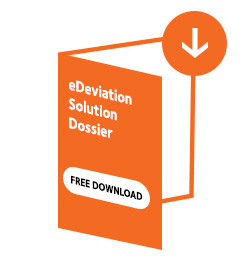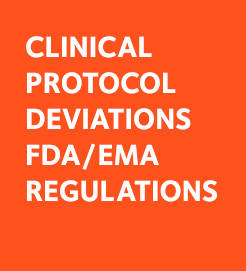eDeviation®:
Online software system designed to support the process of assessing protocol deviations.
Escalation
Ethics Committee (EC)
The Ethics Committee is an independent body in a member state of the European Union, consisting of healthcare professionals and non-medical members, whose responsibility is to protect the rights, safety and wellbeing of human subjects involved in a clinical trial and to provide public assurance of that protection, by, among other things, expressing an opinion on the clinical trial protocol, the suitability of the investigators involved in the trial and the adequacy of facilities, and on the methods and documents to be used to inform trial subjects and obtain their informed consent
1.
Institutional Review Board (IRB)
Under the US FDA regulations, an IRB is an appropriately constituted group that has been formally designated to review and monitor biomedical research involving human subjects. In accordance with FDA regulations, an IRB has the authority to approve, require modifications in (to secure approval), or disapprove research. This group review serves an important role in the protection of the rights and welfare of human research subjects.
The purpose of IRB review is to assure, both in advance and by periodic review, that appropriate steps are taken to protect the rights and welfare of humans participating as subjects in the research. To accomplish this purpose, IRBs use a group process to review research protocols and related materials (e.g., informed consent documents and investigator brochures) to ensure protection of the rights and welfare of human subjects of research
2.
IRB/EC Review Process
EC/IRB regularly review all requested exceptions and reported deviations. Major protocol violations that occur in research that involves minimal risk (originally reviewed and approved via expedited review procedures, or determined by the convened IRB to meet expedited review criteria) may be eligible for expedited review.
IRB/EC review of Major Protocol Violations
Each protocol violation report should discuss what measures have been put in place to prevent future re-occurrences of the same event. The investigator should also evaluate protocol violations for any trends or patterns that would require additional corrective actions or submission of a protocol modification to prevent future violations. Repeated violations of a similar nature may be a clear indication that a permanent change (i.e. a modification) to the study procedures is necessary.
For Federal reporting purposes the IRB will need to determine whether the protocol violation constitutes an instance of serious or continuing non-compliance. The investigator will receive an Acknowledgement of Protocol Violation.
IRB/EC review of Minor Protocol Violations
Each protocol violation report should discuss what measures have been put in place to prevent future re-occurrences of the same event. The investigator should also evaluate protocol violations for any trends or patterns that would require additional corrective actions or submission of a protocol modification to prevent future violations. Repeated violations of a similar nature may be a clear indication that a permanent change (i.e. a modification) to the study procedures is necessary.
IRB/EC review of Protocol Exceptions
Investigators requesting a protocol exception must submit a protocol exception request to the IRB office with any supporting documentation. The protocol exception is processed within the IRB office. The submission is pre-reviewed for completeness and determines the level of review required.
The IRB/EC usually review the protocol exception via expedited review procedures and document their determination. Once a determination is made by the IRB/EC, the investigator will receive a notification of determination from the IRB/EC.
Management and Reporting of Protocol or GCP Deviations and Serious Breaches
If a deviation from the protocol or GCP occurs during a trial, the PI must be notified and it must be recorded on the ‘Protocol Deviation Log’. The ‘Protocol Deviation Log’ should be kept in the Investigator Site File (ISF) and be made available for regular review during monitoring/audits by members of the trial management team.
Members of the trial management team will review the ‘Protocol Deviation Log’ regularly and:
- decide whether deviations need to be investigated further
- ensure that the relevant information has been obtained and recorded
- ensure appropriate remedial action has been taken and documented
- ensure serious breaches have been reported and the Sponsor informed
If the deviation is classified by the PI as a ‘serious breach’ according to the definition above, the PI should complete a ‘Notification of Serious Breach of Trial Protocol or GCP’ form in addition to recording the deviation on the ‘Protocol Deviation Log’. The notification form must be signed by the PI or other medically qualified person who is fully aware of the trial protocol and authorized to do so by the PI.
Planned Changes to Research Protocol
The most common planned changes to research protocols are made through submission of changes such as an increase in subject number, changes in investigators or key personnel, a change to the funding source, changes in procedures and revised consent documents. These all involve an amendment to the protocol and are not protocol deviations themselves (although they may result from a protocol deviation).
In the case of deviations which are planned exceptions to the protocol such deviations should be reviewed and approved by the IRB, the sponsor, and by the FDA for medical devices, prior to implementation, unless the change is necessary to eliminate apparent immediate hazards to the human subjects (21 CFR 312.66), or to protect the life or physical well-being of the subject (21 CFR 812.150(a)(4)).
Principal Investigator
A Principal Investigator (PI) is the individual in a given hospital or medical center responsible for the preparation, conduct, and administration of a research study, grant, cooperative agreement, training, public service project, contract, or other sponsored project.
Protocol Deviation
A protocol deviation is any change, divergence, or departure from the study design or procedures defined in the approved protocol, consent document, recruitment process, or study materials (e.g. questionnaires) originally approved by the IRB. Protocol deviation is a general term and includes, protocol exceptions, changes made to avoid immediate harm to subjects, and protocol violations.
3,4Protocol deviations can be either major or minor.
Protocol deviations may include unplanned instances of protocol noncompliance. For example, situations in which the clinical investigator failed to perform tests or examinations as required by the protocol or failures on the part of subjects to complete scheduled visits as required by the protocol, would be considered protocol deviations.
Repeated failure by an investigator to report protocol deviations may be viewed as non-compliance with the US federal regulations and other international regulations.
Major protocol deviation
An accidental or unintentional change to, or non-compliance with the IRB-approved procedures (e.g., the protocol, informed consent document, recruitment process or study materials) without prior sponsor and IRB approval. Major protocol deviations generally do:
Increase risk and/or decrease the benefit to the participants;
Affect the subject’s rights, safety or welfare and/or the integrity of the research data.
Minor protocol deviation
A minor or administrative departure from the IRB-approved protocol procedures (e.g., the protocol, informed consent document, recruitment process or study materials) that was made without prior sponsor and IRB approval. It is an accidental or unintentional change to or non-compliance with the research protocol that does not:
Increase the risk or decrease the benefit to the patient;
Significantly affects the subject’s rights, safety or welfare and/or the integrity of the research data.
Protocol Deviation Form
The form(s) used by the Protocol Deviation Review Committee members to perform and record their assessment. The forms can be processed as paper or, as online fillable forms using Electronic Data Capture (EDC) provided by the eDeviation® software.
Protocol Deviation List
A list of all Protocol Deviations, whether Major or Minor that have been discovered by any of the parties involved in a Clinical Trial (site staff, Principal Investigator, Monitor…).
Protocol Deviation Review Workflow
The procedure, as described in the Protocol Deviation Review Charter, by which the Protocol Deviation Review is made. It is usually defined by stating:
- How many coincident judgments are needed for a valid assessment
- How PDRC members judgments are reported in the final assessment
- What happens in case of disagreements
- What happens in case of re-submission following changes in the finding information
Protocol Deviation Status
A protocol deviation may be in one of the following statuses within the process of review: not reviewed, in review or reviewed.
Protocol Exception
A temporary protocol deviation that is pre-approved by the sponsor and the IRB prior to its implementation. Protocol exceptions are generally for a single subject (e.g., the patient/subject is allergic to one of the medications provided as supportive care) or, occasionally, a small group of subjects. The protocol exception is usually evaluated by both the sponsor and the IRB in order to determine that it does not increase the risk to the subject (s), or jeopardize the integrity of the research data. Documentation of sponsor (or FDA) pre-approval and IRB approval of the exception should be maintained in the study file.
Protocol exceptions must be submitted to IRB and granted approval prior to subject enrolment and implementation, except where necessary to eliminate apparent immediate hazards to the Human Subjects
5,6,7.
The investigator has ultimate responsibility for obtaining prior IRB approval for protocol exceptions. Repeated failure to obtain prospective IRB approval for protocol exceptions may be viewed as non-compliance with the US federal regulations and more generally with the guidelines that govern ethical conduct of research.
An example of protocol exception would be the enrolment of a research subject who fails to meet all of the protocol eligibility criteria (e.g., the subject may have been evaluated for all other parameters, and it was determined that not meeting this inclusion criteria or laboratory screening value would not cause harm to the subject or alter the validity of the study).
Protocol Violation
A protocol violation is a subset of protocol deviation. It is any planned or intended change or deviation from the IRB approved study protocol, consent document, recruitment process, or study materials that were not approved by the IRB prior to implementation. Generally, protocol violations occur after the subject is enrolled in the research. However, some protocol violations, such as deviations from the approved consent process, can occur before the subject is enrolled in the research. Protocol violations may be either major protocol violations or minor protocol violations, based on their relative severity.
Major Protocol Violation
A major protocol violation is a deviation that has an impact on subject safety, may substantially alter risks to subjects, may have an effect on the integrity of the study data, or may affect the subject’s willingness to participate in the study. All major protocol violations must be reported by the investigator to the IRB within five (5) working days of learning of the violation.
No matter who discovers a major protocol violation (e.g., sponsor or their agent during a monitoring visit), the investigator is responsible for reporting it to the IRB.
Minor Protocol Violation
A minor protocol violation is one that does not impact subject safety, compromise the integrity of the study data, or affect the subject’s willingness to participate in the study. No matter who discovers a minor protocol violation (e.g., sponsor or their agent during a monitoring visit), the investigator is responsible for reporting it to the IRB.
All minor protocol violations do not require prompt reporting and should be reported by the investigator to the IRB within ten (10) working days (or no later than at the time of continuing review) of learning of the violation.
Serious Breach
A serious breach is a deviation from the trial protocol or GCP which is likely to effect to a significant degree:
a) The safety or physical or mental integrity of the subjects of the trial; or
b) The scientific value of the trial
The Sponsor has delegated the responsibility of identifying and assessing serious breaches occurring during the day to day running of the clinical trial to the Principal Investigator (PI).
Unplanned Changes to Research Protocol
This category includes unplanned changes to a clinical protocol not approved by the IRB. Such unplanned changes are either protocol deviations or protocol violations. These unplanned changes may include changes of the IRB- approved research protocol, Good Clinical Practice (GCP) guidelines or regulatory standards.
____________________________________________________
1 Directive 2001/20/EC
2 US FDA: Institutional Review Boards Frequently Asked Questions. Guidance for Institutional Review Boards and Clinical Investigators. January 1998
3 45 CFR §46.103 (b) (4) (iii)
4 21 CFR §56.108 (a) (4)
5 DHHS 45 CFR §46.103(b)(4)
6 FDA 21 CFR §56.108(a)(4)
7 ICH 3.3.7

 CRO-Safe
CRO-Safe CRO-Safe
CRO-Safe


